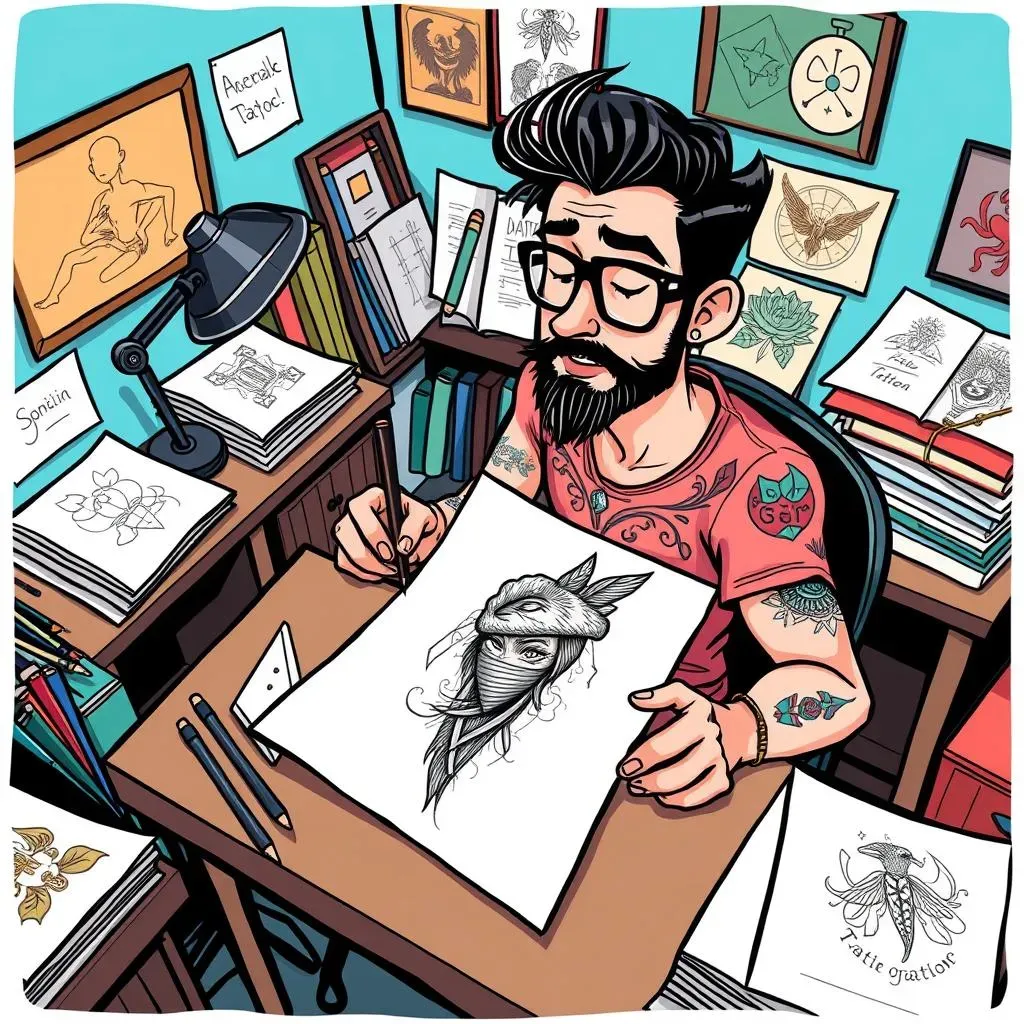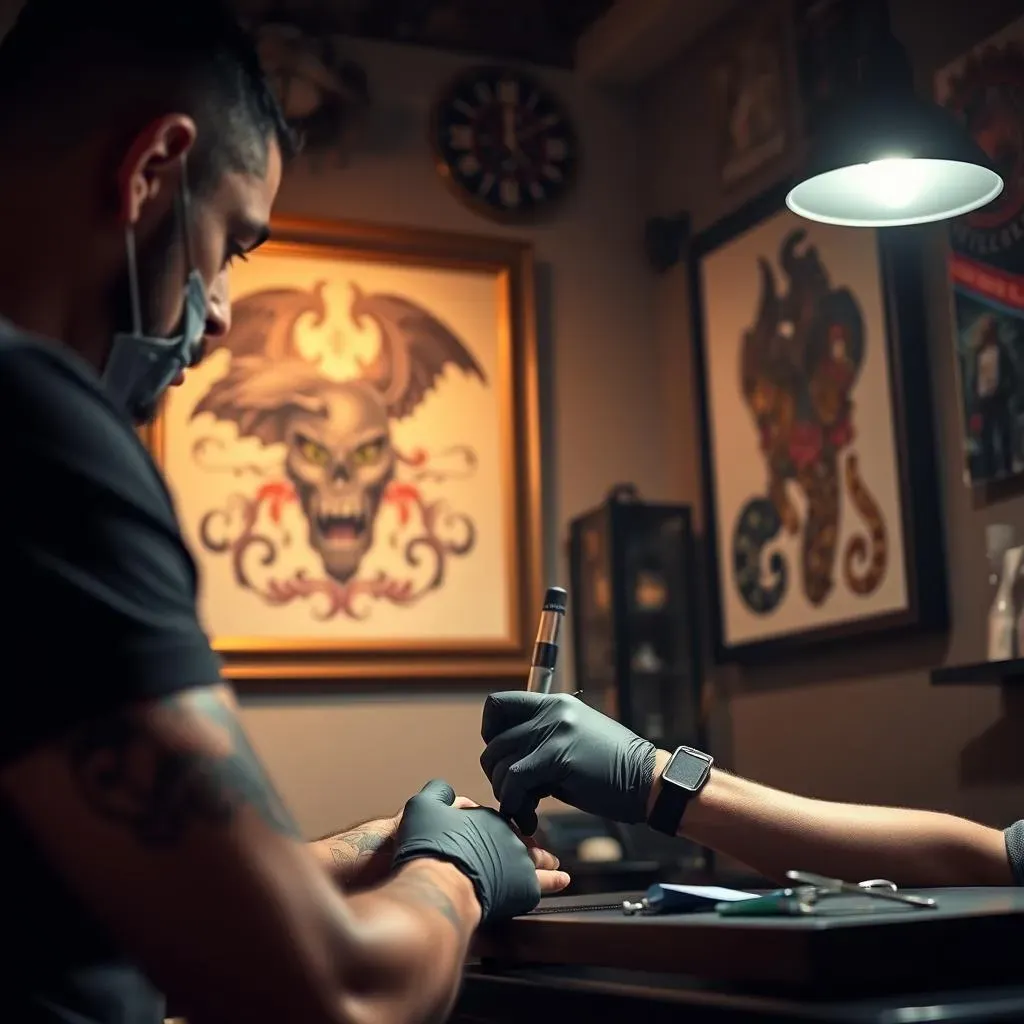Table of Contents
Ever admired a stunning tattoo and wondered, "are tattoo designs copyrighted?" It's a question that's not as straightforward as you might think. Tattoos, those permanent pieces of art etched onto our skin, exist in a fascinating legal gray area. This article will walk you through the ins and outs of tattoo copyright, exploring who owns the rights to those intricate designs and what that means for both the artist and the person sporting the ink. We'll break down the legal basics, discuss how copyright law applies to tattoos, and highlight some real-world examples to make things clearer. Get ready to understand the world of ink and intellectual property, because whether you're a tattoo enthusiast or an artist, knowing your rights (and responsibilities) is essential. We'll also cover what to do if you think you are infringing on a copyright, and some tips to stay safe and creative.
Tattoo Designs and Copyright Law: The Basics
Tattoo Designs and Copyright Law: The Basics
What is Copyright, Anyway?
so let's talk about copyright, the thing that makes sure artists get credit for their work. Think of it like this: when someone creates something original, like a drawing, a song, or yes, even a tattoo design, they automatically own the rights to it. This means they get to decide who can copy, share, or use their creation. It's like having a special key to your own treasure chest, and only you can decide who gets to peek inside. This protection is automatic and doesn't require a fancy registration, though registering can help if you ever need to defend your work in court. So, that awesome design your tattoo artist drew up? It's their treasure, and copyright is the key.
Copyright law aims to strike a balance. It protects the artist's rights but also allows for the creation of new works, that can be inspired by existing ones. It's not about preventing all use of ideas, but about preventing the direct copying of specific expressions of those ideas. The law covers a lot of different types of creative work, from books and movies to software and, of course, tattoos. It's important to know, copyright isn't about protecting ideas, but rather the specific way those ideas are presented. Like, you can't copyright the idea of a dragon, but you can copyright your own unique dragon drawing.
How Copyright Applies to Tattoos
Now, let's get to the juicy part: how does all this copyright stuff apply to tattoos? Tattoos are considered visual works of art, just like paintings or sculptures, and therefore, they can be protected by copyright. This means that the tattoo artist, as the creator of the design, is generally the copyright holder. This is true even if the design is based on some idea you had. It's the artist's specific interpretation and rendering of that idea that is protected. That tribal arm band you have, or that detailed back piece with the lotus flower? The artist who designed it most likely owns the copyright to that specific design.
It’s worth noting that the copyright usually covers the specific design, not the idea or concept behind it. For instance, if you tell your artist you want a skull with roses, they can't stop another artist from drawing another skull with roses, but they can stop others from using the exact same design they created for you. This distinction is crucial, as it allows for artistic freedom while still protecting individual works. It's all about the specifics, the unique lines, shading, and style that make a particular tattoo design stand out.
Copyright Concept | Tattoo Application |
|---|---|
Original Work | Unique tattoo designs created by the artist. |
Automatic Protection | Copyright protection exists as soon as the design is fixed (drawn). |
Protection of Expression | Specific lines, shading, and style of the tattoo design are protected. |
Not Protected | General ideas or concepts (e.g., a skull with roses) are not protected. |
Who Owns the Rights? Tattoo Artists vs. Clients
Who Owns the Rights? Tattoo Artists vs. Clients
The Artist's Claim
so we've established that tattoo designs can be copyrighted, but who exactly owns that copyright? Generally, it's the tattoo artist. They're the ones who put pen to paper (or stylus to tablet) and create the unique design. It’s their creative expression, their artistic choices that make the design what it is. Even if you come to them with an idea, it’s the artist’s interpretation and execution of that idea that's protected. Think of it like a musician who writes a song based on a story someone told them – the musician owns the copyright to the song, not the storyteller. The same logic applies here, and it’s important to understand when you walk into a tattoo shop.
This ownership means the artist has the exclusive right to reproduce, distribute, and create derivative works based on their tattoo design. So, if you want to use that design for something other than having it on your skin, like printing it on t-shirts, you’d technically need their permission. It might seem like a minor detail, but it’s a crucial part of respecting the artist's intellectual property. It also explains why many tattoo artists are protective of their work, and why some have started to put watermarks on their social media posts.
The Client's Role
Now, what about the client? You’re paying for the tattoo, so surely you own it, right? Not exactly. While you own the physical tattoo on your body, you don't own the copyright to the design itself. Think of it like buying a painting – you own the physical painting, but the artist still owns the copyright to the image. You can display it, enjoy it, and even show it off to your friends, but you can’t reproduce it without the artist's consent. The same applies to your tattoo. You have the right to display your tattoo, but you don’t have the right to reproduce it on merchandise or use it as a logo, for example.
However, this doesn't mean you have no rights. You have an implied license to have the tattoo on your body, and to show it off. This implied license is also usually understood to mean that you can take photos of your tattoo, as long as it’s for personal use and not for commercial purposes. It's all about the balance between the artist's right to protect their work and your right to enjoy the art you've chosen to wear. It's like a shared experience, where the artist creates, and you carry and display that creation.
Ownership Aspect | Tattoo Artist | Client |
|---|---|---|
Copyright of Design | Owns the copyright to the specific tattoo design. | Does not own the copyright to the design. |
Reproduction Rights | Has the right to reproduce, distribute, and create derivative works. | Does not have the right to reproduce the design commercially. |
Usage of Tattoo | Can control how the design is used beyond the tattoo itself. | Has an implied license to display the tattoo on their body. |
Situations and Exceptions
There are situations where the lines can get a bit blurry. For instance, if you contribute significantly to the design process, working closely with the artist to create something truly unique, you might have a stronger case for a shared copyright or a specific agreement. However, this is rare, and it's always best to discuss these matters with your artist beforehand. It's also important to consider that while the design is protected, the actual tattoo on your body can't be copyrighted by you or the artist. It’s the design itself that is under protection, not the physical manifestation on your skin.
Another exception to consider is when the tattoo is based on an existing copyrighted work, like a character from a movie or a logo. In these cases, the tattoo artist isn't the copyright holder, but the original creator of that work is. Getting a tattoo of a copyrighted character without permission from its owner could be considered copyright infringement. That’s why some artists refuse to do this kind of work, or they recommend that you get permission from the copyright holder. When in doubt, it's better to be safe than sorry, and have a conversation with the artist about the source of the design.
Copyright Infringement: When Tattoos Cause Trouble
Copyright Infringement: When Tattoos Cause Trouble
What Exactly is Infringement?
So, you're probably wondering, what does copyright infringement even look like in the tattoo world? Well, it's basically using someone else's copyrighted tattoo design without their permission. Think of it like using someone else's essay and pretending it’s your own. It's not just about copying the design exactly, either. Creating a design that's substantially similar to an existing one can also be a problem. It's like making a copy of a song that's slightly different but still recognizable as the original. This kind of copying can lead to legal trouble for both the tattoo artist and the client, though it's more often the artist who gets into hot water.
The tricky part is that "substantially similar" can be a bit subjective. What one person sees as a clear copy, another might think is just inspired by. This is where things get messy, and it often ends up being up to a court to decide. It’s not about having a similar style or theme; it’s about the specific details and creative choices that make a design unique. If a tattoo artist copies another artist’s specific lines, shading, and overall composition, they're likely infringing on their copyright. This is why it's so important for artists to develop their own style and for clients to be aware of the potential issues.
Real-World Examples of Tattoo Copyright Issues
Let's look at some situations where tattoo copyright infringement has become a real issue. Imagine a tattoo artist who sees a design they really like on Instagram. They copy the design, make small changes, and then use it for their client. This is a clear case of copyright infringement. Or, a client might find a tattoo design online and ask their tattoo artist to replicate it. If the original design is copyrighted, that artist could be facing a lawsuit, even if they didn't know they were copying a protected design. It happens more often than you think, and it’s not always intentional.
Another common scenario involves tattoos of copyrighted characters or logos. Getting a tattoo of Mickey Mouse, for example, without Disney's permission is technically copyright infringement. While Disney might not go after every individual with a Mickey tattoo, they could if they wanted to, especially if they were using the tattoo for commercial purposes. This is why many artists refuse to do these kinds of tattoos, or they recommend getting permission from the copyright holder first. You also might see some tattoo artists who are commissioned to do work that ends up being used on posters, or t-shirts, which is a commercial use and usually requires permission from the artist.
Scenario | Copyright Issue | Potential Consequences |
|---|---|---|
Copying a design from another artist | Direct infringement of the original artist's copyright. | Legal action, fines, and damage to reputation. |
Replicating a copyrighted character | Infringement of the character's copyright. | Legal action from the copyright owner. |
Using a tattoo design on merchandise | Commercial use without permission from the copyright holder. | Legal action, fines, and cease-and-desist orders. |
How to Avoid Copyright Trouble
So, what can you do to avoid getting into trouble with tattoo copyright? For tattoo artists, the best approach is to create original designs and avoid copying others’ work. Develop your own style, and let your creativity shine. If you're inspired by another artist, make sure you’re taking inspiration from the concept or idea, not the specific execution. For clients, it's important to be mindful of where your tattoo ideas come from. If you find a design online, it's best to ask your artist to create something similar but unique, rather than asking them to copy it directly. Be respectful of artists and their work, and understand that their designs are their intellectual property.
Another important tip is to have a clear conversation with your tattoo artist about copyright. Make sure that you both understand that the artist owns the copyright to the design, and that you have an implied license to show it off on your body. If you’re planning on using your tattoo design for anything beyond that, make sure you get permission from the artist first. It's also a good idea to have these agreements in writing, so that there are no misunderstandings later on. Remember, when it comes to tattoos and copyright, a little bit of awareness and communication can go a long way.
Navigating Tattoo Copyright: Practical Tips and Advice
Navigating Tattoo Copyright: Practical Tips and Advice
Alright, so you've made it this far, and you're probably thinking, " this copyright stuff is a bit of a maze." Don't worry, it is! But, let's break it down into some simple, practical steps for both tattoo artists and clients. For artists, it’s all about creativity and originality. Think of it as a challenge to develop your own unique style and approach to design. Don't be that artist who's just copying and pasting from others. It's not only ethically wrong, but it can also land you in some serious legal trouble. Instead, use other designs as inspiration, and then add your own twist. If you're struggling, try sketching from life, exploring different art styles, or collaborating with other artists. The more you hone your skills, the less likely you will be to copy someone else’s design, even accidentally.
And for you, the client, it's about respect and awareness. When you're looking for a tattoo, don't just pick something off the internet and demand that your artist copy it exactly. Instead, try to find an artist whose style you love, and then work with them to create something that's uniquely yours. Be clear about your ideas, but allow the artist some creative freedom. If you’re bringing a reference, explain what you like about the design, and ask them to make something that is inspired by, not a copy of, the original. Most artists are happy to work with you, as long as you’re respectful of their work and their time.
Tips For | Practical Advice |
|---|---|
Tattoo Artists | Focus on creating original designs. Develop your unique style. Seek inspiration, but avoid copying. Consider collaborating with other artists. |
Clients | Respect the artist's copyright. Do not ask for exact copies of existing designs. Work with your artist to create something unique. Be mindful of the source of your tattoo ideas. |
Communication is key here, folks! Never be afraid to ask questions. If you’re an artist, be clear with your clients about who owns the copyright to the design. If you’re a client, ask your artist about their process, and make sure you understand that you’re paying for the tattoo on your skin, not for the copyright of the design. It’s also a good idea to get any agreements in writing. This can help prevent misunderstandings later on. Think of it like a contract, that protects both parties and ensures everyone is on the same page.
And finally, let's talk about licensing. If you’re an artist, and you want to use your tattoo design for commercial purposes, like putting it on merchandise, you’ll need to make sure you have the right to do so. If you’re a client, and you want to use your tattoo design for something other than showing it off on your body, you’ll need to get permission from the artist. This might involve paying them a fee or entering into a licensing agreement. It might seem like a lot of extra hassle, but it's essential to avoid any copyright infringement issues. Remember, it's always better to be safe than sorry, and a little bit of planning can go a long way. So, let's all be responsible and respectful of each other's work, and enjoy the beautiful art of tattoos, without stepping on any legal toes.
- For Artists: Always create original designs. Develop your unique style. Avoid copying others.
- For Clients: Respect the artist's copyright. Don't ask for exact copies. Work together to create something unique.
- Communication: Discuss copyright with your artist. Get agreements in writing.
- Licensing: Understand when permissions are needed. Do not use tattoo designs commercially without permission.
Wrapping Up: Navigating the World of Tattoo Copyright
So, are tattoo designs copyrighted? The short answer is: often, yes. It's a complex issue with no easy answers, but understanding the basics is crucial for both tattoo artists and clients. Remember, the artist generally holds the copyright to their original designs, and getting a tattoo doesn't automatically grant you the right to reproduce it. While the legal landscape around tattoos is still evolving, being aware of these principles can help you avoid potential copyright issues. When in doubt, it's always best to communicate with the artist, respect their creative work, and seek legal advice if necessary. Ultimately, respecting intellectual property ensures a healthy and vibrant tattoo community for everyone.